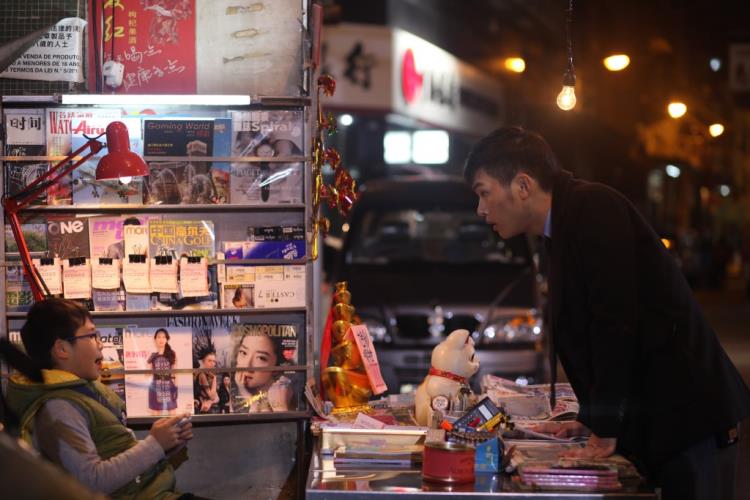Lio is a writer and the film adaptation of her novel Diago was one of the competitors in the Official Selection Competition of the Karlovy Vary International Film Festival 2010.

Film still for Macau Stories 3 Photo courtesy of Chao Koi Wang
In my three previous articles on “Films and the development of cultural and creative industries in Macao”, I have talked about situations of Macao movies, and there is no real linkage to “culture and creativity”. As a matter of fact, not only are Macao movies on a difficult long path, so is the whole culture and creative industry in Macao.
Overall, we lack an industry-chain to “standardise”: if we can’t consistently follow the path of “cultural creativitycultural productsmarketing”, there is no genuine culture and creative industry.
Take the creation of film and television dramas as example. It needs screenwriters, directors, actors, post-production, marketing, sales and distribution, showing cinemas and broadcasters etc., involving multiple industries, enterprises and related sectors. We have splendid stories, some of which have been filmed, but to realise the value of such cultural products, i.e. to put the films on the market, is no easy task. Firstly, there is no distributor or theatre chain in Macao; secondly, whether distributors and theatre chains like Macao movies depend on the quality of the movies. We have local movies hugely favoured by Macao audiences which have been shown for almost 20 times, but we can’t say it has been tested by the commercial market if these movies have yet to enter markets in Hong Kong, Taiwan, or the mainland.
From the beginning I have been unwilling to discuss Macao movies in the context of culture and creative industry because it will be like destroying budding flowers. Why do I say this?
There are two terms in the phrase “culture and creative industry”–“culture and creative” and “industry”. Macao has only experienced the kick-start for a few years, but the feeling is that related parties have gone from “culture and creative” to the extreme end to focus only on industrialising it. It is certainly justified for the government to promote the culture and creative industry and be realistic to expect results, but it lacks pragmatic mind: we have a lot of “congenital deficiencies”, we don’t have enough talents, we don’t have an industry chain, and we lack the market—these should not be overlooked. There’s no place on earth that didn’t spend at least 10 to 20 years and invest tremendous amount of capital in developing the culture and creative industry. The task of the government’s special fund should be to nurture a “pond” in the policies and provide necessary policies and capital guarantee for the development of the culture and creative industry. At the same time, it cannot give up on dreamers for entrepreneurs. Industrialisation without an industry chain will be in vain.
Youngsters with a culture and creative ambition are all dreamers. Some of them will realise their dreams, but some will not. Are “dreams” equal to “fantasies”? If yes, I’m afraid that “China Dreams” and “Macao Dreams” are bigger fantasies!
Why did the government propose to develop the culture and creative industry? Because it wants to promote social and economic diversification, direct the economy from relying solely on the gaming industry, and provide another path for youngsters. Those who are interested to join the industry have nothing but creativity and a dream. They don’t come from a rich family to give them money at their back. They need more opportunities to grow, and they are bound to stumble on their way. At least we need to give them opportunities over a specified period in which we try our best to give aid and sponsor. Some people are actually doing culture and creative undertakings, which may be the golden egg yet to be hatched, but these people are mocked. But some businessmen who make a fortune with their business mind become the pioneer in promoting culture and creative industry as soon as they “put on the cultural coat”.
If the government is so result-oriented and think only entrepreneurs can hatch golden eggs, then it should set up a “Macao Enterprise Fund” to promote developments of all enterprises, instead of the special fund for culture and creative industry.
After all, Macao movies need to mature on this path to bear eternal beauty.
Therefore, please allow time and space for Macao movies to grow.
(Films and the development of cultural and creative industries in Macao series 4. End.)